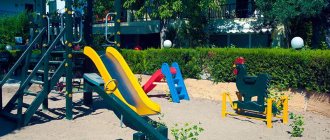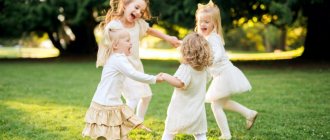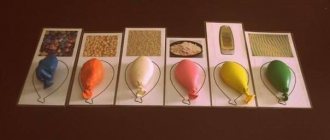Games by theme
Didactic games
For preschoolers (senior and preparatory groups). Games with rules. Board games, card games, lotto, dominoes, construction sets, puzzles, checkers and chess...
Educational games for kids
For young children (junior and middle groups). Development of fine motor skills and coordination, first acquaintance with color, shape and size. Choose by color, screw on the lid, insert a button, braid your hair, games with clothespins, lacing, find a pair, sensory mats and corners, collect beads, felt toys...
Math games
REMP. Formation of ideas about number and quantity, size, shape. Development of spatial orientation, familiarity with time. Count, find the figure, determine the size, logic problems, counting sticks, geocont, tangram, puzzles, geometric lotto, abacus, clock...
Music games
Formation of a sense of rhythm, development of musical perception, familiarity with notes. Musical instruments, homemade noise instruments, games with notes and sounds, musical corners.
Creative games in fine arts
Acquaintance with folk art, artists and paintings. Development of aesthetic perception, color perception, familiarity with the rules of composition. Arts and crafts, patterns and ornaments, palette, drawing games, make a portrait, put together a landscape...
DIY books
Homemade baby books, albums, soft, tactile, lapbooks...
Games on ecology and familiarization with the surrounding world
Consolidating knowledge about natural objects and phenomena, animals and plants. Plants, animals, insects, planet Earth, weather, space, water, sand...
Seasons and calendar
Seasons, months, days of the week, parts of the day, regime and daily routine...
Layouts
Ecological (landscape), traffic regulations, historical, local history, seasonal...
Traffic rules: games, manuals
Traffic rules, signs, traffic lights, cars, street layouts...
Speech therapy games
Development of breathing, articulation, formation of correct sound pronunciation, learning to read and write, sounds, letters. Automation of difficult sounds, exercises with sounds, letters and syllables, vowels and consonants, make up a word, games for breathing development...
Speech development games
Development of coherent speech, grammatical and lexical structure. Based on literary works, based on reference pictures. Mnemonic tables We form adjectives, coordinate words, use prepositions, formulate questions, games based on fairy tales and literary works...
Guides for role-playing games
Attributes and aids for role-playing games, accessories, clothing, furniture
Theater in kindergarten
Do-it-yourself puppet, finger, tabletop and other types of theaters, masks. Theater corners.
Suits
Carnival, theater, dance and other homemade costumes for children and adults
Local history games
Clarification of ideas about the Motherland, native land, its history, the Second World War. Regional component.
Folk, folklore, round dance games
Games of different nations. Games of our grandmothers, our childhood, round dance games.
Games to develop imagination, TRIZ
Invention games. We train analytical thinking, learn to identify, compare, and solve problems.
Psychological games
Development of emotions, communication skills. Games for a good mood, little girls, for dating. Mood corners
Outdoor games
Active games outdoors and at home.
Physical exercises, gymnastics, exercises
Physical exercises, attributes, finger games.
Non-standard equipment for physical education
Sports and physical education corners, equipment for physical education, sports competitions, relay races. Massage paths
Life of a child in kindergarten
Life of a child in kindergarten
The importance of preschool education
How we want to see our future largely depends on us and the principles that we instill in the minds of children. What a person is, such is his activity, such is the world he creates around himself.
Childhood is a unique period in a person’s life; it is during this time that health is formed and personality develops. Childhood experiences largely determine a person's adult life.
In our age of computer technology, it becomes more and more difficult for a person to adapt to many factors. That is why, the sooner and more often each person begins to develop, the greater success he can achieve in his development, building a career and in his life.
Preschool preparation makes it possible from a young age to instill in a child an interest in the world around him, a thirst for knowledge and an independent determination of assigned tasks.
It is necessary to start preschool education programs as early as one and a half years old and successfully continue until the age of seven, when the child continues his education in the first grade.
Having received an excellent preschool education, children come to school well prepared, learn the curriculum better, and quickly achieve good grades in their studies.
Many parents believe that they can provide proper preparation for their child themselves. However, do not underestimate the importance of preschool education, because in kindergarten work is carried out in a group format, surrounded by other children, and this is exactly what awaits your child when he goes to school.
The key role of preschool education is to create conditions for the formation of a harmonious, spiritually rich, physically healthy, developed personality with aesthetic consciousness, creative abilities for individual self-expression through creative activity.
They say that children are the flowers of life. And adults are gardeners. And only how we invest the good and protect from the bad depends on how our flower will grow.
During preschool age, it is very important to develop basic mental processes such as memory, perception, thinking, speech. The program “From birth to school” is an innovative general educational program document for preschool institutions. In the foreground is the developmental function of education, which ensures the development of the child’s personality. The teacher focuses on the individual characteristics of the child. The primary goal of a kindergarten is to create favorable conditions for a child to fully enjoy preschool childhood, form the foundations of a personal culture, comprehensive development of mental and physical qualities, prepare for life in modern society, for studying at school, and ensure the safety of a preschooler’s life.
It is very important that the child develops not only fully, but also comprehensively: the physical and intellectual development of the baby. So, for example, many activities in kindergarten are focused on developing the child’s gross and fine motor skills. Both of them are equally important and significant in the process of development of a preschool child.
Great importance is attached to the development of fine motor skills in children in kindergarten. The level of development of the child’s speech depends on how well it is developed. It has been proven that it is at the age of 1.5-3 years that the child is most susceptible to active speech development.
The intellectual and creative development of children in kindergarten is of great importance. A number of different techniques used by educators in their work are aimed at this.
In kindergarten, the child develops as a social personality. It is easier for a socially developed child to contact the outside world. What allows a child to quickly settle into society? First of all, the baby’s skills and abilities to serve himself independently. The activities of kindergarten teachers are aimed at developing these skills and abilities, at developing independence in the child.
Another area of activity is the physical development of children. Active outdoor games, sports competitions and physical education classes contribute not only to the physical development of the child, but also to strengthening his health and the body's defenses.
In general, we can conclude that a child’s presence in kindergarten has a positive effect on his development, and that kindergarten is the most appropriate environment for acquiring knowledge and skills.
Interaction between teacher and family
The concept of modernization of Russian education in the current period emphasizes the exclusive role of the family in solving the problems of education.
The Law of the Russian Federation “On Education” states “Parents are the first teachers. They are obliged to lay the foundations for the physical, intellectual and moral development of the child’s personality already in infancy.”
The concept of “education” is considered today from different positions, various definitions of educational competence are given, each author has his own vision. However, in Russian culture and pedagogy, the meaning of education has always been associated with the spiritual growth and development of a person, moral formation and personal development.
For a child, the spiritual center and moral foundation is the family, its values, foundations, relationships - the family way of life. Therefore, it is no coincidence that in recent years the work of an educational institution with families has become especially important and significant.
Cooperation between the teacher and parents is the key to successful educational activities with preschoolers, since the family has a significant influence on the development of the child’s personality. Making parents active participants in the pedagogical process is one of the main tasks of the educator.
The task of the educator is to help parents understand their parental and educational mission as the greatest responsibility for the future of the child. It is also important that raising preschool children in a family is a single, inextricable process.
The need and importance of cooperation between family and kindergarten has never been questioned.
The effectiveness of preschool educational institutions in educating children largely depends on the extent of interaction with the family.
The teacher plays a huge role in organizing cooperation between the preschool educational institution and the family. It is his work that determines how much the family understands the actions carried out by the preschool educational institution in relation to the education of children and participates in their implementation. One of the most important tasks of a teacher is to promote unity, family cohesion, establish mutual understanding between parents and create comfortable, favorable conditions for the development of the child. A successful solution to this problem is possible if the basis of educational work is the idea of cooperation between educators, parents and children.
Children, parents, teachers are members of one team. We are united by common concerns and problems, the outcome of which largely depends on the nature of their interaction.
Cooperation between the teacher, children and parents is realized in various forms of joint activities:
- parent meeting once a quarter;
— individual conversations (as necessary);
— consultations;
— organizing joint activities of parents and children (once a quarter): involving parents in holding holidays, organizing excursions, and doing socially useful work in a group;
— organizing the work of the parent committee;
— encouraging parents for cooperation (at the end of the quarter, at the end of the school year).
It is necessary to provide assistance to parents in raising children because the majority of parents are non-professional educators; they require pedagogical and psychological assistance in solving educational problems. At the same time, parents need to be familiarized with the content and features of the educational process. As a result, parents become active members of the group and are involved in joint activities with their children.
Reasonable alternation of various forms of joint activities leads to the fact that children and parents are not afraid to have a frank conversation with each other, all problems are solved together.
When organizing joint activities of parents and children, we must try to ensure the formation of friendly and mutually interested relationships in the family, and involve parents in solving children’s problems.
Work with parents can be done through collective, group and individual forms of interaction. For example, a discussion of any parenting problem at a parent meeting can be continued during individual meetings with parents, as well as in consultations.
Particular attention should be paid to individual forms. Since it is in individual communication that parents become more imbued with anxieties and problems and subsequently become allies of the teacher. All parties benefit from successful interactions. The following can be considered a positive result of cooperation in a group:
— respect from parents for the teaching staff;
- improving interpersonal relationships, increasing authority in the eyes of children;
- greater satisfaction with the work done together, a more creative approach to it;
- better knowledge by parents of children and educational programs, a sense of their importance in kindergarten; strengthening families and improving communication with children;
- a better attitude of children towards the development of their knowledge and skills, successful social status.
Success in the work of a teacher with a pupil’s family will be when relations with parents are built on high respect for the interests of the family, parental authority, on full assistance to the family in its spiritual enrichment and thereby in its cultural and moral influence on children.
There will be a great effect in the interaction between the family and the teacher if the teacher gives the opportunity to take initiative and supports parents in all matters in the group. When communicating with a group of parents, the teacher must show courtesy and correctness, and the ability to restrain his emotions. Only then can you count on the support of parents in all activities carried out in the group. When starting to work with families of pupils, it is necessary to discuss the rules of communication that the teacher will follow when working with parents.
The result of the teacher’s work on interaction between family and kindergarten is manifested in different aspects:
- improving relationships with the child, mutual understanding;
- what place the child occupies in the life of his parents, whether he feels protected and safe in it;
- in the parent’s awareness of the importance of the role of mom or dad, and then of their activities, parental responsibility, which extends not only to their child, but also to other children;
- in the optimistic view of parents on solving family problems and the formation of parental pedagogical reflection;
- in the manifestation of parental solidarity, cohesion, activity in the educational process.
The interaction between the preschool educational institution and the family should contribute to the development of a modern kindergarten, on the one hand, and on the other hand, mean a turn of society towards the needs of the family.
We, educators, understand perfectly well that parents have entrusted us with their most precious treasure - their children, and our duty is to justify this trust, and this is only possible with close cooperation, commonality of affairs, mutual understanding of all parties, which is what we strive for.
“Our mission is to protect a child’s heart from bitterness, troubles and suffering” (V. A. Sukhomlinsky).
Only equal creative interaction between an educational institution and the families of students is the key to the full development of a child.
Games for preschool and primary school children
By groups:
- Senior group
- Preparatory group
- Middle group
- Junior group
Showing publications 1-10 of 36154. All sections | Children's games
New
Photo
The best
Express game “Wash your hands with soap”
a game
Ages from 3-5 are notable for the fact that the child does everything himself. The more you remain silent while practicing educational logic games, the better. Does not apply to games for hearing development, which are included in a separate list! If you've never played with...
Card index of games on communication skills Games and exercises for the development of communicative competence of older preschoolers Games aimed at creating a friendly attitude towards each other, showing attention and creating a good mood: “Compliments”
Beautiful, calm music sounds. Children sit on the carpet in...
Baby hygiene: what will be useful in kindergarten?
Each particular kindergarten may also ask you to bring various personal items for the child, including:
- Bibs for feeding, preferably plastic rather than cloth, two or three pieces are enough.
- A set of dishes for your baby, the simplest ones that you don’t mind breaking.
- To sleep, you may need your own set of bed linen, oilcloth, and replacement sheets.
- A girl should always have in her locker: a comb, hairpins, elastic bands, and hair bands.
- Their own towel for their hands, and in the summer also for their feet; after a walk, children will be taught to wash their feet from sand.
Children's games - Game with parents of the preparatory group “One Hundred to One”
Publication “Game with parents of the preparatory group “One Hundred to...” 1st round. A simple game Question - Theater begins with a hanger, but where does school begin? - from the lobby 10 - from the locker room 8 - from students 6 - from September 1 4 - from the briefcase 3 - from the run around 1 2nd round. Double game (points x 2) Question - Your child received a deuce. How will you welcome him home? -...
Image library "MAAM-pictures"
Using the game “Double” for the development of speech in preschoolers Speech is a great gift of nature, thanks to which people receive ample opportunities to communicate with each other. Full command of the native language in preschool childhood is a necessary condition for solving the problems of mental, aesthetic and moral education of children to the maximum...
Game-construction through speech development. Activities of the educator. Children's activities. Beginning of the game. Q: Guys, I have prepared an interesting poem for you. Listen to him “Wonderful money came out” Q: What is it about Q: Let’s name them. IN; Do you want to play a game in which these prepositions will be Children listen to a poem About...
Game “Hospital” average group 4–5 years Topic: “Hospital” Age: Average group 4-5 Program content: Educational: Develop in children the ability to independently develop the plot of the game “Hospital”; promote the independent creation and implementation of game plans; Educational task for children with disabilities:...
Children's games - Using Voskobovich games to develop mathematical abilities
Article "Use of Voskobovich's games for the development of mathematical..." Abstract-message on the methodology of using Voskobovich's educational games in the logical and mathematical education of preschool children. The accessibility and manufacturability of the material used in these games will allow the child, every time he interacts with the game, to discover its new and new facets...
Consultation for parents “Developing speech games for little ones” At about a year old, babies begin to become interested in the objects around them. Take advantage of this feature of a one-year-old child and offer him very real games. Today, the market for games for children is very diverse: a lot of different educational games are produced for kids...
Manual "Mirilka"
Work experience on the topic: “Development of speech of young children through small folklore forms.” Manual: Mirilka Goal: to develop in children the ability to establish and maintain contacts with peers using small folklore forms. Procedure: children place their hands on their palms and...
A selection of games for children of the younger group The game “We woke up.” The teacher reads a poem. Listening to the text, children complement the poem with gestures: “The sun came out for a walk, to play with us. Get ready, people, for our merry round dance! The sun has risen in the morning - it’s time for us to wake up. Stretch, hurry up...
Pages: … 3616
Development of a child’s thinking in a creative form
Psychologists believe that in preschool age role-playing play is the leading activity leading to the development of the child’s psyche. Trying on the role of an adult causes strong emotional experiences, regulates relationships and influences the development of character and personality. One should also take into account such positive effects on the child as the load on both hemispheres of the brain, which is necessary during lateralization and develops creative and analytical abilities, getting rid of pseudo-concepts and overcoming negativism.
Games for children unobtrusively teach new skills, develop thinking and imagination, and help establish control over behavior. In a playful form, it is easier and more effective to convey information, teach how to concentrate and solve problems. Modeling a variety of activities makes it possible to learn new experiences and acquire original models of individual behavior. The process brings joy and pleasure to the child, he easily gets involved and shows genuine interest, independently understands the tasks and actively searches for answers, tries to cope with difficulties.
Original creative programs will appeal to girls and boys, will help in mastering knowledge and skills, and will bring benefit and variety to learning.
All sections



